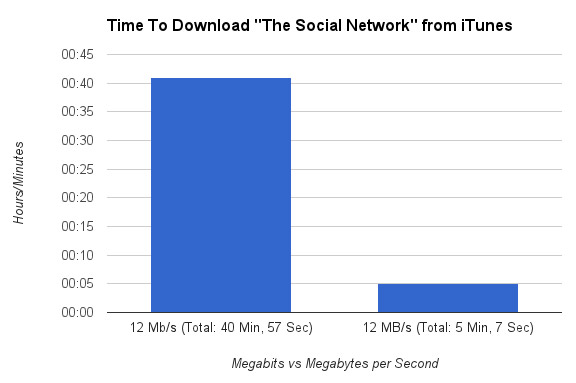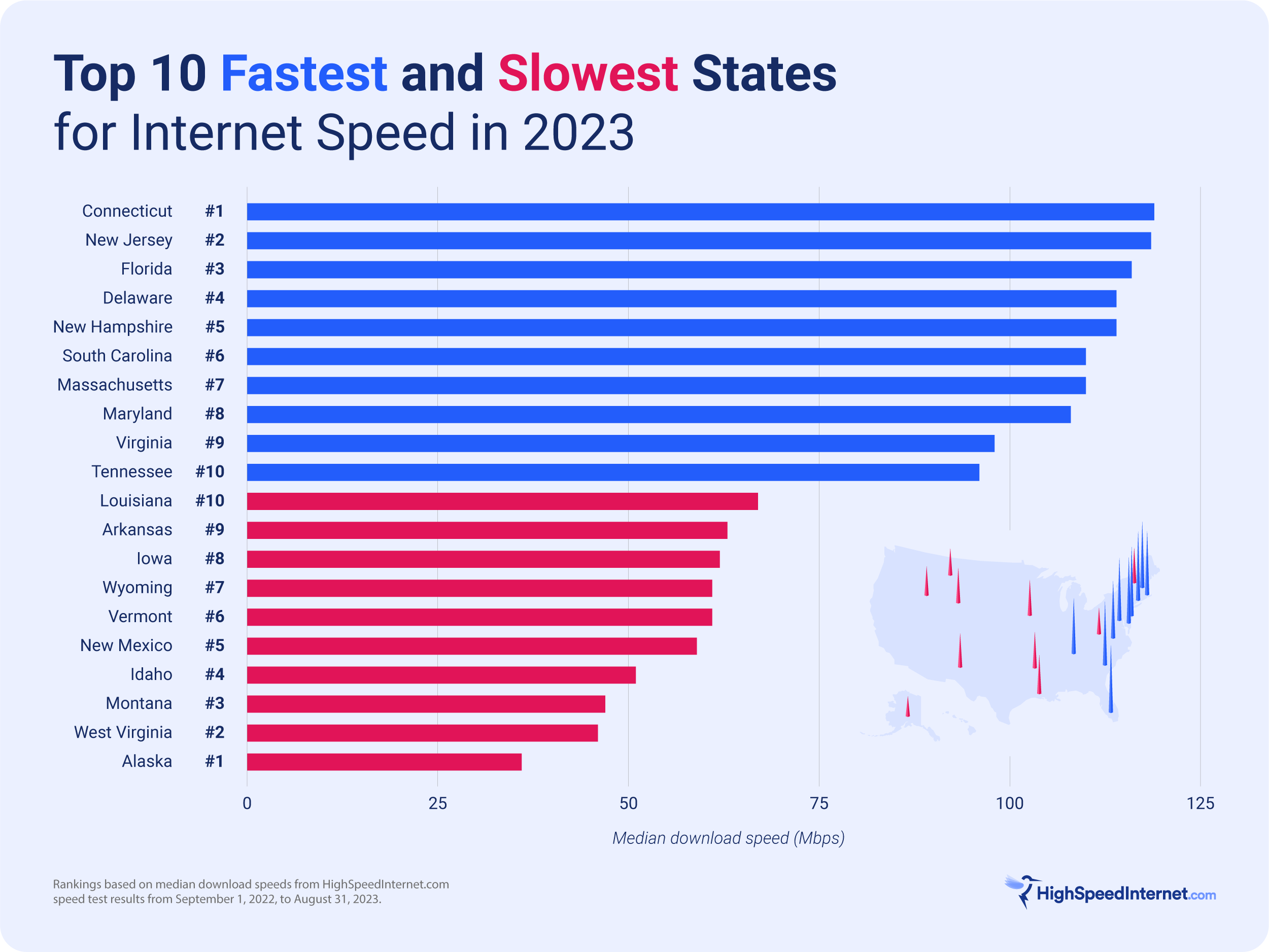A Comprehensive Overview to Measuring Megabits Per Second for Home Usage
A Comprehensive Overview to Measuring Megabits Per Second for Home Usage
Blog Article
How Megabits Per Second Impact Your Online Activities
The idea of megabits per second (Mbps) plays a pivotal duty in forming our on-line experiences. Greater Mbps can improve performance and decrease interruptions, while insufficient rates might cultivate stress and inadequacy.
Comprehending Megabits Per Second
When thinking about web speed, it's necessary to comprehend the idea of megabits per second (Mbps), which acts as a conventional measurement for information transfer rates. This metric evaluates just how much information can be transmitted over a net connection in one second, giving a clear understanding of performance abilities - Megabits Per Second. For context, one megabit amounts to one million bits, and Mbps is commonly made use of to share bandwidth for different online tasks
A higher Mbps indicates a much faster internet link, allowing customers to execute jobs such as downloading and install documents, searching websites, and engaging in on the internet video gaming much more effectively. For example, common surfing needs around 1-5 Mbps, while streaming high-definition video might require 5-25 Mbps. Recognizing these requirements is essential for establishing the suitable internet speed needed for details tasks.
Furthermore, the number of tools linked to a network can impact general performance. Several users streaming, video gaming, or downloading at the same time can strain readily available data transfer, leading to slower speeds - Megabits Per Second. Evaluating individual online habits and requirements is essential in choosing a net plan that aligns with one's needs, making certain a smooth digital experience
Streaming and Buffering Issues
Streaming high-def material has actually come to be a staple of modern on-line enjoyment, yet it is typically gone along with by irritating buffering issues. These disturbances can dramatically detract from the watching experience, causing dissatisfaction and potential loss of target market interaction. Buffering happens when the data sent from the streaming service is not obtained promptly sufficient to preserve a smooth playback, commonly because of inadequate web speed gauged in megabits per second (Mbps)

Furthermore, real-time streaming can be impacted by network congestion, which occurs when several tools share the same transmission capacity. Consequently, optimizing link rate and guaranteeing adequate Mbps is important for a seamless streaming experience. As streaming services proceed to advance, understanding the impact of Mbps on buffering concerns remains essential for customers looking for continuous enjoyment.
Online Pc Gaming Performance
The impact of internet speed on online activities extends past streaming, dramatically affecting on the internet gaming performance. In affordable gaming, reduced latency and high data transfer are crucial for a seamless experience. A rapid link lessens lag, enabling players to respond promptly to in-game events, which can be the distinction in between success and loss.
Data transfer, measured in megabits per second (Mbps), plays an essential function in sustaining several devices and pc gaming systems all at once. Insufficient data transfer can bring about went down links or decreased video game high quality, negatively affecting gameplay. On-line multiplayer video games require considerable data transfer, especially throughout peak video gaming hours when various gamers are online.
Moreover, the sort of game can also dictate hop over to these guys the necessary net speed. Busy first-person shooters require greater rates to keep responsiveness, while turn-based approach video games might operate reasonably well on reduced rates. As on-line pc gaming continues to evolve, with enhancing graphical fidelity and more intricate multiplayer settings, the need for higher Mbps will only escalate. Players ought to ensure they have ample net rate to boost their pc gaming performance and overall experience. Spending in a durable web connection is essential for players aiming to enhance their performance and enjoyment.
Video Clip Conferencing Quality
In today's electronic landscape, video clip conferencing quality is greatly influenced by internet rate, particularly in regards to transmission capacity and latency. High-quality video clip calls require enough data transfer to transmit audio and video clip information perfectly. Usually, a minimum of 1.5 Mbps upload and download rates is suggested for conventional meaning video, while high-def video clip conferencing normally requires at least 3 Mbps.
Latency, or the hold-up between sending out and getting information, also plays an essential function in the customer experience. Low latency makes sure that discussions flow normally without awkward stops or interruptions. Ideally, latency must be below 150 milliseconds for reliable interaction. Higher latency can cause resemble, lag, and disjointed communications, which can hinder partnership and involvement during meetings.
Moreover, several individuals in a video clip meeting can stress readily available bandwidth, requiring also greater rates. Network congestion, commonly triggered by simultaneous tasks like streaming or downloading, can additionally degrade video top quality. Therefore, for organizations counting on video clip conferencing for remote collaboration, recognizing the partnership between megabits per general and second communication top quality is crucial for keeping performance and boosting online communications.
Choosing the Right Net Plan
Choosing a suitable net strategy is important for guaranteeing optimal efficiency in different on-line activities, especially in setups that demand high transmission capacity, such as video clip conferencing and online video gaming. Megabits Per Second. When thinking about a web plan, it is necessary to assess both the rate and data allowance to match your particular use demands
For houses with numerous customers participating in synchronised tasks, a strategy supplying greater megabits per second (Mbps) is recommended. Normally, a minimum of 25 Mbps appropriates for typical streaming and surfing, while strategies exceeding a knockout post 100 Mbps are better for even more extensive jobs. Additionally, take into consideration the nature of your online activities; video clip conferencing calls for at the very least 1.5 Mbps upload rate, while online video gaming might require a reduced latency but regular link.
It is additionally crucial to evaluate your information cap. Endless data strategies can prevent strangling and interruptions, particularly if hefty use is anticipated. Last but not least, research study service suppliers in your location, as accessibility and pricing can vary. By attentively he has a good point selecting a net plan tailored to your needs, you can enhance your online experience, ensuring smooth, nonstop accessibility to your favored activities.
Conclusion
Finally, the importance of megabits per second (Mbps) in shaping on-line tasks can not be overemphasized. Greater Mbps facilitates seamless streaming, reduces buffering, improves gaming experiences, and ensures high-quality video conferencing. Alternatively, insufficient transmission capacity can bring about discouraging disruptions and decreased performance across numerous jobs. An extensive understanding of private or household Mbps needs is essential for choosing a proper web plan that properly sustains varied online activities and customer needs.

Generally, a minimum of 25 Mbps is suitable for standard streaming and surfing, while plans surpassing 100 Mbps are preferable for more extensive jobs. In addition, consider the nature of your online activities; video conferencing needs at least 1.5 Mbps publish rate, while on the internet pc gaming might need a reduced latency however constant link.
Report this page